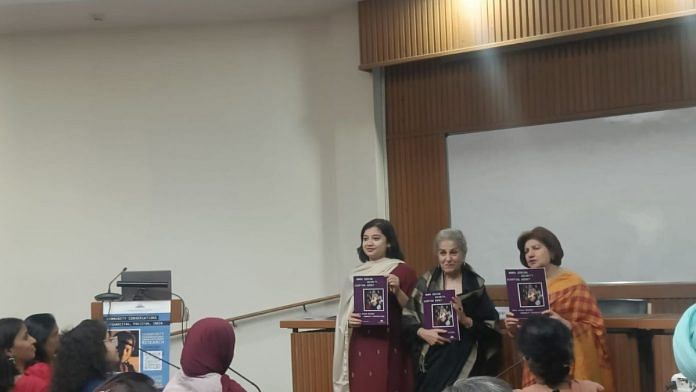New Delhi: Katera Hashimi, a Pashtun woman, undertook a harrowing journey to India in 2021. Her decision to flee was driven by the Taliban gouging her eyes out as punishment for serving as a policewoman. Hashimi then sought refuge in Delhi, receiving the medical help she needed.
Katera’s story is just one among many featured in the Women’s Regional Network’s report on the India-Afghan refugee community. Titled ‘Women Seeking Security’ and launched at New Delhi’s India International Centre, it brought together Afghan women, human rights defenders, and researchers to spotlight the plight of those forced to flee the Taliban – only to face new challenges in the country they escaped to.
The launch of the report, which focused on women in conflict zones, was followed by a panel discussion moderated by Rita Manchanda, journalist, co-author of the report and Consultant at Peace & Security in South Asia; Bilquees Daud, an assistant professor at the Jindal School of International Affairs; Hamsa Vijayraghavan, COO, Migration Asylum Project, and Nitya Ramakrishnan, a senior advocate.
“The women’s question in Afghanistan is a question that has toppled regimes. This initiative contributes to the global effort aimed at highlighting the Taliban’s discriminatory and misogynistic policies. It emphasises that the harsh enforcement practices of these policies constitute a systematic framework of gender apartheid. Gender subjugation is deeply ingrained in the ideology that upholds the Taliban’s regime,” said Rita Manchanda.
The report, according to her, aims to establish normative standards for international acknowledgement and action against gender apartheid. “It seeks to position gender apartheid as a recognised crime against humanity.”
Women without a homeland
When the Taliban overran Kabul in 2021, one of the first things it did was abolish the 2004 Afghan constitution, which guaranteed equal rights for women.
“The issue of women has always been politicised because, on one hand, we have always been a traditional or religious society. But on the other hand, in many societies and even in rural areas, the wave of radicalisation has changed the way of living,” said Bilquees Daud, an Afghan refugee herself.
She added that Afghanistan, deeply rooted in tradition and patriarchy, paradoxically was the first country in the region to grant women the right to vote.
The report shed light on a significant demographic: young, unmarried Afghan women who constitute over a quarter of those seeking refuge in India. These women hail from modest, middle-class backgrounds in Kabul’s provinces and rural areas. Despite early marriages, domestic obligations, and disapproval from in-laws, many of them continued education in hiding. Most of the report’s respondents – about 28 per cent – were young women aged between 25 and 34. And nearly a quarter of them held either technical or university degrees.
Also read:
The problem of asylum
In the past, India showed leniency in granting tourist and medical visas to Afghans seeking asylum. However, it restricted the practice after the Taliban takeover in 2021. Many of these refugees remain homeless, said Hamsa Vijayraghavan.
She noted that women constituted a major chunk of these Afghan refugees. They were driven by urgent safety concerns, especially related to sexual and gender-based violence.
Their decision to seek shelter in India was influenced by sheer practicality. India seemed to offer more anonymity and safety compared to Pakistan, where existing familial connections could have potentially jeopardised their security.
Nitya Ramakrishnan spoke about the importance of discussing these realities. She stressed on their ability to influence the discourse on the rights of refugees, for which India doesn’t have a comprehensive framework yet. Ramakrishnan cited the Citizenship Amendment Act (CAA) as an example of a discriminatory policy, underlining the need for laws grounded in human rights principles.
Nobody wants to be a refugee; Afghan women just have limited alternatives, Vijayraghavan added.
The sombre mood was, perhaps, captured best in a poem recited by a displaced Afghan woman.
“I am homeless, far from my mother’s arms. I am a princess of fire and blood. Where is the soil that nurtured me? Where is it, my friend? What should I do in the soil of others?”
(Edited by Zoya Bhatti)




I found the title of this article to be somewhat aggravating and frankly non-sensical. What does it imply? That these women are stuck with India for the lack of better alternatives? Surely, they are able to seek asylum elsewhere, e.g., the Maldives, Bangladesh, Malaysia, etc. Also, how is it India’s problem that the society in their homeland has been mired in never ending conflict and seems to have failed to evolve a sense of common decency and tolerance? Still, they are in India and from all accounts are safe there. Then why is it that India and its laws, namely the CAA, are being portrayed in a poor light?